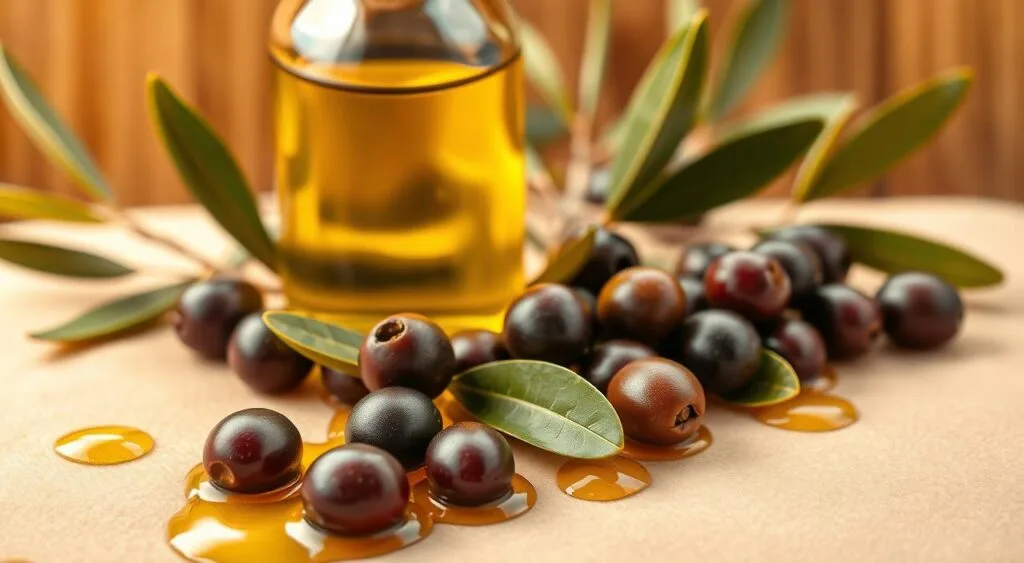In the sun-drenched groves of the Mediterranean, olive oil is more than a mere culinary ingredient. It is the lifeblood of a storied region famed for robust health and longevity. Exploring the health benefits of olive oil, we find the essence of this golden elixir. It has graced countless tables with its rich, full-bodied flavor.
Esteemed for its role in the Mediterranean diet, olive oil’s impressive nutrition profile makes it one of the most heart-healthy oils available. It seamlessly merges indulgence with wellness.
Key Takeaways
- Understanding how olive oil can significantly contribute to heart health as one of the few universally recognized heart healthy oils.
- Recognizing olive oil as a staple food in the Mediterranean diet, which has been linked to longevity and reduced chronic disease risks.
- Appreciating the vast array of health benefits of olive oil, from anti-inflammatory properties to aiding in weight management.
- Diving into the diverse olive oil nutrition facts, highlighting its rich content of healthy fats, vitamins, and antioxidants.
- Learning to seamlessly incorporate high-quality olive oil into your diet for optimal health benefits and gustatory pleasure.
What is Olive Oil and Its Types?
Olive oil is loved for its taste and health perks. It comes in different types and qualities. Knowing the differences helps us get the most health benefits, especially from monounsaturated fats and oleic acid.
Extra Virgin vs. Virgin Olive Oil
Extra virgin olive oil is top-notch. It’s made from the first pressing of olives, without chemicals. It tastes unique and is full of monounsaturated fats and oleic acid, great for your heart.
Virgin olive oil is also good but not as high quality. It’s processed without chemicals but has a lighter taste. It has less of the nutrients found in extra virgin olive oil.
Light Olive Oil: What Does It Mean?
“Light” olive oil doesn’t mean it has fewer calories. It means it’s lighter in color and taste. It’s been refined a lot, losing some natural flavors and nutrients.
So, it might not be as healthy as extra virgin olive oil.
Refined Olive Oil: Is It Healthy?
Refined olive oil is made from lower quality oils. It’s been refined to remove impurities. But, it loses a lot of flavor, color, and nutrients.
It still has oleic acid, but it’s not as good for you as extra virgin olive oil.
Nutritional Profile of Olive Oil
Exploring the olive oil nutrition facts, we see it’s more than just a cooking ingredient. It’s full of healthy fats and antioxidants in olive oil. This makes it a key part of a healthy diet.
Essential Fatty Acids in Olive Oil
Olive oil is known for its monounsaturated fats, mainly oleic acid. This supports heart health. Since our bodies can’t make these fats, we need to get them from food. Olive oil is a good choice instead of saturated fats found in other oils, as the American Heart Association suggests.
Vitamins and Antioxidants Present
Olive oil is rich in antioxidants like vitamin E and polyphenols. These help fight oxidative stress and inflammation. They also help prevent chronic diseases. These nutrients add flavor and boost the olive oil nutrition facts profile.
Caloric Content of Olive Oil
Olive oil has a lot of calories, like most fats. But, using it in small amounts can be part of a balanced diet. Harvard Health Publications suggest using it wisely to get its health benefits without upsetting energy balance.
Olive Oil and Heart Health
Olive oil is known for its heart healthy oils and monounsaturated fats. It plays a big role in cholesterol management and heart health. Adding olive oil to your diet helps your blood vessels stay healthy and supports long-term wellness.
How Olive Oil Affects Cholesterol Levels
Olive oil has a big impact on cholesterol levels. The monounsaturated fats in it lower bad LDL cholesterol. At the same time, it keeps or raises good HDL cholesterol. This balance is key to stopping fats from building up in arteries, which lowers heart disease risk.
The Role of Olive Oil in Reducing Blood Pressure
Studies show olive oil can lower blood pressure. This is thanks to its polyphenols and monounsaturated fats. They help relax blood vessels, making blood flow better and easing heart pressure.
Cardiovascular Benefits Supported by Research
Research links olive oil to better heart health. The Predimed study showed a big drop in heart disease in those eating a Mediterranean diet with olive oil. This backs the American Heart Association’s advice to eat healthy fats for better heart function and health.
Anti-Inflammatory Properties of Olive Oil
Olive oil is a key part of the Mediterranean diet. It’s known for its flavor and health benefits, especially its anti-inflammatory effects. A special compound called oleocanthal in olive oil helps fight inflammation, similar to ibuprofen.
Key Compounds that Fight Inflammation
Oleocanthal in olive oil works like anti-inflammatory drugs. It stops enzymes that cause inflammation. This makes olive oil great for lowering the risk of chronic diseases. Studies show oleocanthal is a natural fighter against inflammation, making olive oil a must in a healthy diet.
Olive Oil vs. Other Cooking Oils
Olive oil is better than other oils for fighting inflammation. While many oils have good fats, olive oil’s oleocanthal makes it stand out. It not only reduces inflammation but also acts as a strong antioxidant, protecting the body from harm.
Practical Tips for Incorporating Olive Oil
- Use olive oil as the main fat for cooking instead of butters or other oils to get its anti-inflammatory benefits.
- For a raw option, drizzle olive oil over salads, dips, and breads to keep its nutrients and get more oleocanthal.
- Store olive oil in a cool, dark place to keep its anti-inflammatory compounds and make it last longer in your kitchen.

How Olive Oil Supports Weight Management
Olive oil is known for its health benefits and is key for managing weight. It’s packed with healthy fats that help with weight management. These fats also make you feel full, which is good for your diet.
The Role of Healthy Fats in Diet
Healthy fats, like those in olive oil, are vital for health and weight control. Unlike bad fats, the fats in olive oil keep energy stable and support cell health.
Olive Oil as a Satiating Food
Eating foods with healthy fats, like olive oil, makes you feel full. This is important for controlling hunger. It helps you avoid unhealthy snacks, aiding in weight management.
Studies on Olive Oil and Metabolism
Studies show olive oil can boost your metabolism. This is crucial for weight management. It helps burn fat and increases energy use, even when you’re not active.
Adding olive oil for weight loss to your meals is tasty and healthy. It supports a healthy weight and offers many other health benefits.
Benefits of Olive Oil for Skin and Hair
Olive oil is not just great for cooking. It’s also amazing for your skin and hair. It acts as a natural moisturizer and is full of antioxidants. This makes it perfect for beauty and wellness routines, improving both hair and skin care.
Olive Oil as a Moisturizer
Olive oil is packed with vitamins and fatty acids. It deeply moisturizes the skin. Using it regularly keeps your skin elastic and fights dryness. It’s a top choice for those who want healthy, hydrated skin.
Treatments for Hair Health
Olive oil is also great for your hair. It moisturizes and tackles problems like dandruff and dry scalp. Its nutrients make your hair stronger and shinier. Adding olive oil to your hair care routine can greatly improve your hair’s health.
Anti-Aging Properties of Olive Oil
Olive oil’s antioxidants, like squalene and vitamin E, fight aging. They protect your skin from damage and reduce wrinkles. This helps keep your skin looking young and healthy.

The Role of Olive Oil in Digestive Health
Olive oil is a key part of the Mediterranean diet. It’s loved for its taste and health perks. It boosts digestive health, helps the gut microbiome, prevents digestive issues, and acts as a natural laxative.
Benefits for Gut Microbiome
Olive oil is full of good fats and antioxidants. It helps grow good bacteria in the gut. This is key for absorbing nutrients, boosting the immune system, and even mental health. Adding olive oil to your diet can make your digestive system stronger and more balanced.
Preventing Digestive Disorders
Olive oil’s anti-inflammatory effects are great for the gut. It can lower inflammation in the stomach and intestines. This helps prevent problems like irritable bowel syndrome and ulcerative colitis. It also makes the digestive tract smoother, reducing the chance of ulcers and other issues.
Olive Oil as a Natural Laxative
Olive oil is also a natural laxative, helping with constipation. Its texture makes it easy for stool to move through the intestines. Drinking a tablespoon of olive oil in the morning can help kickstart your digestive system.
Olive Oil and Its Impact on Diabetes
Olive oil is famous for its taste and health benefits, especially for diabetes. It helps control blood sugar, boosts insulin sensitivity, and is part of the Mediterranean diet. This makes it great for managing diabetes.
How Olive Oil Affects Blood Sugar Levels
Research shows that olive oil’s monounsaturated fats can keep blood sugar stable. Adding olive oil to meals can lower the sugar spike from food. This is key for people watching their blood sugar.
The Mediterranean Diet and Diabetes Management
The Mediterranean diet is full of fruits, veggies, whole grains, and olive oil. It’s linked to better health, including managing diabetes. This diet is low in bad fats and high in fiber, helping keep blood sugar balanced.
Research on Olive Oil and Insulin Sensitivity
Improving insulin sensitivity is key for diabetes control. Studies suggest olive oil can help the body use insulin better. This is thanks to its antioxidants, which are found in its phenolic compounds.
Cooking with Olive Oil: Tips and Tricks
Using olive oil in cooking boosts flavors and health. This guide covers expert tips, food pairings, and storage to keep olive oil fresh.
Best Practices for Cooking with Olive Oil
Choosing the right olive oil is key. Extra virgin olive oil is great for dressings and finishing dishes. For high-heat cooking, use lighter oils with a higher smoke point.
- Avoid overheating olive oil to maintain its health benefits and flavors.
- Use olive oil as a healthy substitute for butter in baking, offering a subtle, fruity undertone to baked goods.
Pairing Olive Oil with Various Ingredients
Olive oil is versatile and pairs well with many foods. Extra virgin olive oil’s fruitiness is perfect for salads and marinades, enhancing flavors.
- For a simple yet exquisite pairing, drizzle olive oil over steamed vegetables and add a sprinkle of salt and herbs.
- Blend olive oil with aromatic herbs to create infused oils that elevate pasta dishes and risottos.
Storing Olive Oil to Maintain Quality
Proper storage is vital for olive oil quality. Store it in a cool, dark place away from sunlight. Use sealed containers to prevent air exposure.
- Use dark glass bottles or stainless steel containers to protect olive oil from light.
- Avoid storing olive oil near heat sources such as stoves or ovens.
Conclusion: Embrace the Benefits of Olive Oil
Olive oil is more than just a tasty addition to meals. It’s a key to better health and nutrition. Known as “liquid gold,” it’s packed with benefits for our well-being.
Summary of Health Benefits
Olive oil is full of good fats, antioxidants, and anti-inflammatory compounds. It’s great for the heart, reduces inflammation, and aids digestion. It also helps fight chronic diseases and supports weight management and skin health.
These benefits are backed by science and supported by health experts worldwide.
How to Incorporate Olive Oil into Your Daily Diet
Adding olive oil to your meals is easy. Start by drizzling it over salads or using it in sauces and dressings. Cooking with it at low temperatures helps keep its nutrients intact.
You can also use it in baking or take it straight as a supplement. Just remember to use it in moderation and balance it with other healthy foods.
Final Thoughts on Choosing Quality Olive Oil
Choosing the right olive oil is crucial. High-quality oil tastes better and has more health benefits. Look for certifications and choose extra virgin olive oil for the least processing.
Reputable brands and trusted sources offer guidelines for quality. Investing in high-quality olive oil is a commitment to your health and a nod to olive oil’s rich history.

FAQ
What are the health benefits of including olive oil in my diet?
Olive oil is full of monounsaturated fats, which are good for your heart. It helps keep cholesterol levels in check and supports heart health. It also has antioxidants and anti-inflammatory properties that can lower the risk of chronic diseases.
Moreover, it’s a key part of the Mediterranean diet. This diet is linked to living longer and having fewer health problems.
What differentiates extra virgin olive oil from virgin or light olive oil?
Extra virgin olive oil is the highest quality. It’s made from the first cold pressing of olives, without chemicals or too much heat. It has more antioxidants and polyphenols than other olive oils.
Virgin olive oil is also cold-pressed but might have a bit more acidity. Light olive oil is refined and has a lighter color and taste. It’s for those who like a milder flavor in their cooking.
Is refined olive oil as healthy as extra virgin olive oil?
Refined olive oil is processed to remove flaws and has a milder taste. It has less antioxidants and polyphenols than extra virgin olive oil. Although it’s still good for you, it doesn’t offer the same health benefits.
Can consuming olive oil improve heart health?
Yes, olive oil can improve heart health. Studies like the PREDIMED trial show it can lower heart attack and stroke risks. It helps manage cholesterol and blood pressure, both key for heart health.
How do the anti-inflammatory properties of olive oil compare to other oils?
Olive oil has compounds like oleocanthal that fight inflammation like ibuprofen. It has more of these compounds than other oils. This makes it a top choice for those looking for anti-inflammatory benefits.
What is the role of olive oil in weight management?
Olive oil can help with weight management. It provides healthy fats that make you feel full. This can help reduce appetite and calorie intake. Its monounsaturated fats also help with body weight and fat distribution.
How can olive oil benefit my skin and hair?
Olive oil is a natural moisturizer for the skin. It nourishes and hydrates. Its antioxidants also help with anti-aging by protecting the skin.
For hair, olive oil improves scalp health and strengthens hair follicles. It also gives hair a natural shine.
What makes olive oil beneficial for digestive health?
Olive oil supports digestive health by promoting good gut bacteria. It can prevent digestive disorders with its anti-inflammatory and laxative properties. It’s a natural laxative that helps keep bowel movements regular.
Can olive oil be part of a diet for managing diabetes?
Yes, olive oil is great for managing diabetes. Its monounsaturated fats help regulate blood sugar and improve insulin sensitivity. Adding it to a Mediterranean diet is especially good for diabetics.
What are the best practices for cooking with olive oil?
Use olive oil for low to medium-heat cooking to keep its health benefits and flavors. It’s also great for dressings and marinades. Pairing it with fresh veggies, salads, and lean proteins boosts nutrient absorption and taste.
To keep quality, store olive oil in a cool, dark place away from heat and light.
How should I choose a high-quality olive oil?
Choose extra virgin olive oil with a certification from the International Olive Council. High-quality oil has a fresh, grassy or fruity smell and taste. It might have notes of bitterness or spiciness, showing it has polyphenols.
Always check the harvest date to ensure it’s fresh.
